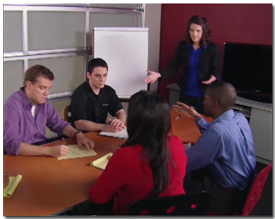You know that helpless feeling when attending a poorly organized office meeting? One with no structure or meaningful objective? Frustrating, isn’t it?
Meetings are so unpopular that one recent poll showed that about half of the people surveyed admitted they’d rather stand in line at the DMV than sit through another meeting. Meetings are seen as dull and time-wasters because meeting leaders spend too much time thinking about what they’re going to say and not enough time thinking about what their meeting attendees are going to say.
The usual approach to planning a meeting is to focus on your speech, your words, your PowerPoint® and your topics.
Turn this around: Think about the meetings you’ve enjoyed the most. Chances are these are the meetings where you’ve contributed the most. You want people to look back and say, “Hey, that was really a great meeting,” and they wouldn’t do that if all they could remember was trying to stay awake as you read the verbatim content of your 58 PowerPoint slides to them.
 Meeting attendees need to feel engaged and a part of the conversation. They should help supply the ideas and energy to the discussion.
Meeting attendees need to feel engaged and a part of the conversation. They should help supply the ideas and energy to the discussion.
The way to make your meeting effective, as well as interesting, is to focus on what your attendees are going to say, playing ringmaster to their performances. Here’s how:
* Use an old trainer’s trick. When someone asks a question, reply with, “Hey, that’s a really good question. What do the rest of you think the answer is?” Get the group involved. That way, you turn what could be a five second response into a 10 minute learning experience. And of course you can still follow up with your answer if the group doesn’t arrive there.
* Prepare provocative questions. Pointing to people and asking them to speak will likely result in wooden responses. Instead, prepare a series of provocative questions for them to address.
Here’s an example from a life insurance company meeting with sales and marketing staff:
The meeting leader says, “Okay, let’s start with handling objections. But before we do that, what are some of the most common objections we run into?”
Immediately, someone responds, “How about, ‘I don’t want to change my lifestyle to suit an insurance company?’”
The meeting leader encourages, looks around and asks for more: “Good! Okay, let’s have some more objections.”
Another person responds with, “One I get a lot is, ‘I’m too old to afford insurance.'”
The meeting leader replies with, “Excellent, what others do you hear?”
* Know your outcome. You don’t want to have a glorified meeting conversation that goes around in circles and gets nowhere. So, be clear in your own mind what the outcome is that you want. Do you want the meeting to decide something? Or do you want the meeting to educate participants? Or what is the outcome that you want?
* Your objective is to help people remember one big thing. People forget most of what is taught or discussed at a meeting. But they can remember one big thing. So ask yourself, “If my attendees only remember one thing from this meeting, what would I like that to be?” And, that’s your main objective for the meeting. You’ll be successful if that objective is achieved.
These are the secrets to having a successful meeting: Don’t focus on what you’re going to say; focus on what they’re going to say. Prepare a series of questions or discussion topics for them to address. Also, be clear in your own mind what the outcome is that you’re hoping for from this meeting, and make sure people remember the one thing you want them to get out of the meeting, and focus your questions to that end.
##########
© ServiceSkills.com We encourage you to distribute this message to colleagues. When you’re ready to empower your staff with proven customer service and team building skills, please let us know.
